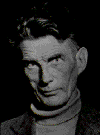
ESTRAGON: Why don't we hang ourselves? VLADIMIR: With what? ESTRAGON: You haven't got a bit of rope? VLADIMIR: No. ESTRAGON: Then we can't.
--from Waiting for Godot
The Irish-born playwright and novelist Samuel Beckett, b. Dublin, Apr. 13, 1906, d. Dec. 22, 1989, is best known for the absurdist drama Waiting for Godot (1952; Eng. trans., 1954). First performed in Paris on Jan. 5, 1953, the play received worldwide acclaim and became the first of a series of critical successes, some of them written earlier.
Beckett came from a Protestant Anglo-Irish family, but much of his work was first written in French. After graduating with a degree in Romance languages from Trinity College, Dublin, Beckett spent two years (1928-30) in Paris as an exchange lecturer. Here he met James Joyce and became a member of his circle. In 1930, Beckett returned to Trinity as a lecturer. The academic life did not agree with him, however, and he left after only four terms to become a free-lance writer. He traveled in Europe and England, settling finally in Paris, his intermittent home since 1937.
Beckett's entire literary output, the narrative prose as well as the dramatic works, reduces basic existential problems to their most essential features. Thus his concerns are fundamental, but never simplistic--the evanescence of life; time and eternity; the individual's sense of loneliness and alienation as a result of the impossibility of establishing genuine communication and contact with others; the mystery of self.
Beckett's major early works constitute a trilogy of interior monologues: Molloy (1951; Eng. trans., 1955), Malone Dies (1951; Eng. trans., 1956), and The Unnameable (1953; Eng. trans., 1958). Here Beckett explores the paradox of the self that can never know itself; in the very act of observing itself the self splits in two, an observing consciousness and an object that is being observed. The self perceives itself as a stream of words, a narration. Each time it tries to catch up with itself, it merely turns into another story, thus putting before the reader a succession of storytellers. Beckett's other prose works also view in various ways the entrapment and anguish of the individual in increasingly grotesque situations and the self's quest for identity from within. These include Murphy (1938; Eng. trans., 1957); Watt (1953), his last novel in English; and, Stories and Texts for Nothing (1955; Eng. trans., 1967), a collection of short stories.
Among his principal plays, pioneering works in the Theater of the Absurd, are Endgame (1957; Eng. trans, 1958), Krapp's Last Tape (1959), Happy Days (1961), Play (1964), Not I (1973), That Time (1976), and Footfalls (1976). He has also written radio and television plays. In his later stage and television plays, Beckett's style is so concise that each work is ultimately reduced to a highly compressed and immensely powerful image.
Beckett received the Nobel Prize for literature in 1969. His 16-volume Collected Works were published in 1970.
Martin Esslin
Bibliography: Acheson, J., and Arthur, K., Beckett's Later Fiction and Drama (1987); Bair, Deidre, Samuel Beckett: A Biography (1978); Bloom, H., intro., Samuel Beckett (1986) and Samuel Beckett's "Waiting for Godot" (1987); Brater, E., Beyond Minimalism: Beckett's Late Style in the Theatre (1987) and, as ed., Beckett at 80 (1986); Cohn, Ruby, Back to Beckett (1974) and Just Play: Beckett's Theatre (1980); Esslin, Martin, Samuel Beckett: A Collection of Critical Essays (1975); Fletcher, John, and Spurling, John, Beckett: A Study of His Plays (1972); Gontarski, S. E., ed., On Beckett (1986); Harvey, Lawrence E., Samuel Beckett: Poet and Critic (1970); Kenner, Hugh, Samuel Beckett (1974) Mercier, Vivian, Beckett/Beckett (1977); O'Brien, Eoin, The Beckett Country (1986); Rabinovitz, R., The Development of Samuel Beckett's Fiction (1984); Rosen, Steven J., Samuel Beckett and the Pessimistic Tradition (1976).
Text Copyright © 1993 Grolier Incorporated
Send all comments, suggestions, and information to fores@uv.es